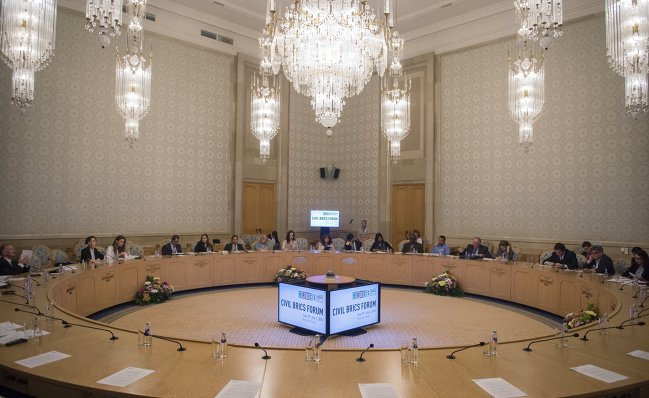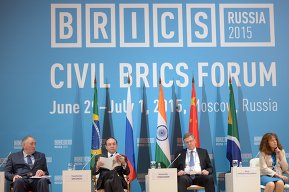
Civil BRICS Forum opens in Moscow
The first Civil BRICS Forum opened in Moscow on 29 June.
Its primary goal is to ensure a constructive dialogue between civil society and decision-makers in the main social spheres - healthcare, education, culture and development, as well as urbanisation and financial issues, to name a few.
During the opening ceremony, Vyacheslav Nikonov, Chairman of the Duma Committee on Education and Chairman of the Board of the Russian National Committee on BRICS Research, read messages of greetings to the forum participants and guests from President Vladimir Putin and Prime Minister Dmitry Medvedev.
Mr Nikonov stated that both civil society and the expert community of the BRICS countries are making a substantial contribution to cooperation among the Five.
He noted that BRICS could become a new model for emerging global relations.
"The Five reflect the irreversible trend towards the current shifting of the gravity centre from the West to the East, from industrialised countries to developing nations, and largely from the North to the South," he said.
In his opinion, in terms of civilisation, the Five are continental centres of power and attraction, and their partnership is only natural.
He recalled that Yevgeny Primakov was an author of the idea of a multipolar world and cooperation among the BRICS countries. "Russia, India and China came to be known as Primakov's Triangle, which was later expanded to the broader BRICS concept," he said.
Participants and guests honoured with a minute of silence the memory of Russia's former Prime Minister Primakov, who died on 26 June in Moscow at the age of 85.
Speaking to media after the forum's plenary session, Mr Nikonov said that a strategy for the BRICS long-term development drafted by expert centres in the Five will be presented at the Ufa Summit. Recommendations based on the results of the Civil Forum are expected to be included in the document. "They will be consonant with the recommendations drafted by the BRICS Expert Council in the past," he said.
Other speakers included: Iosif Diskin, Deputy Director of the Institute of Socio-Economic Problems of the Population at the Russian Academy of Sciences, and member of the Civic Chamber; Alexander Tokovinin, Director of the Foreign Policy Planning Department at the Foreign Ministry; Victoria Panova, Advisor on BRICS Strategic Planning at the BRICS Research Institute, and Assistant Professor at the Foreign Ministry's MGIMO; and Yelena Topoleva-Soldunova, Head of Agency of Social Information, Co-Chair of Civil BRICS Forum.
The forum hosted a photo exhibition consisting of the archives of the State History Museum devoted to the 70th anniversary of Victory over Nazism in World War II.
The first day of the forum concluded with a news conference titled, “BRICS countries’ civil society and the government: Is dialogue possible?” Delegation heads and the forum co-chairpersons spoke at the conference.
Samir Saran, Vice President of the Observer Research Foundation, emphasised that the civil societies in the BRICS countries differ drastically but that their diversity is what contributes to common development.
Monica Herz, Coordinator of the Global South Unit for Mediation of the BRICS Policy Centre (Brazil), also noted the diversity of civil societies in the BRICS countries, adding that the main idea of the forum was to bring this diversity and these differences together to form one union.
Yelena Topoleva-Soldunova, Head of the Agency for Social Information, Co-Chair of the Civil BRICS Forum and member of the Russian Presidential Council for Human Rights, said that it was impossible to achieve effective management at all levels without the participation of civil society. She also added that BRICS countries should pay more attention to developing a better vision of their future to ensure successful economic development.
Speaking on the subject of the importance of civil society and its role on the global stage, Temba Masilela, Deputy Chief Executive Officer for Research at the Human Science Research Council (South Africa), said that civil society not only evaluates the government’s initiatives, but also is a full-fledged participant in the dialogue with the authorities, contributes to forming the political agenda and is an initiator of change.
Georgy Toloraya, Executive Director of the National Committee on BRICS Research and Head of the Russian delegation, said that many issues discussed by the experts had previously been within the cognizance of foreign policy agencies, military and intelligence bodies, but that now civil society is playing a more active role in this dialogue by suggesting interesting ideas and initiatives.
Yelena Peryshkina, Co-Chair of the forum and Director of AIDS Infoshare, outlined the prospects for cooperation between BRICS civil societies using cooperation in healthcare as an example. She said that it is necessary to coordinate efforts within the WHO and the UN to strengthen interregional potential to react to new challenges, for instance, outbreaks of newly emerged infections.
The delegation heads also spoke about the development of recommendations for the upcoming Ufa Summit. Shen Guofang, First Deputy Chairman of the Chinese Foundation for International Studies, said they would focus on how to provide security and peace all over the world, and how global governance should be implemented.
At the conclusion of the news conference, Victoria Panova, Advisor on BRICS Strategic Planning at the BRICS Research Institute and Co-Chair of the forum, expressed hope that the process of involving civil society would continue as part of the next presidencies. “If cooperation between our countries is effective at all levels, this union will allow every participant to increase its influence on the global stage,” she said.
